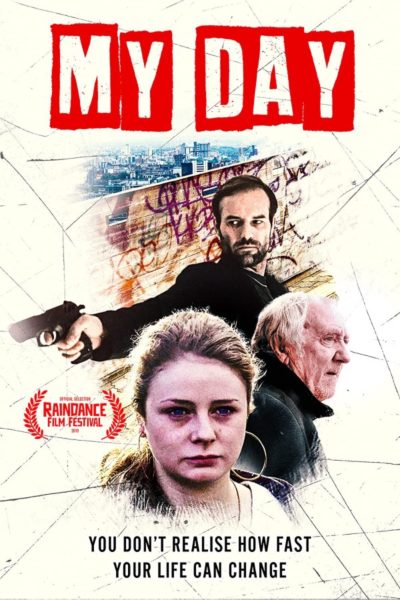 ★★★½
★★★½
“Of Power Swords and Cat People”
When the reboot (you hardly can call this just a remake) of She-Ra and the Princesses of Power – and please note the plural form! – was released by Netflix in 2018, it immediately drew fierce criticism. The main issue was re-designing the classic character of heroine She-Ra as well as others. The original animated series ran from 1985-87, and featured very feminine-looking characters. You could call them the feminine ideal: large in size, fit, attractive and yet still more realistic than the musclebound hero from mother series He-Man and the Masters of the Universe, of which She-Ra was a spin-off.
Though it has to be said: those characters then looked very much alike, as if the same model was used for almost all of them. In the new show, which ran for 5 seasons between 2018-20, the characters look more like prepubescent teenagers, and it was one of the things old fans took issue with. She-Ra and her allies were once an ideal of what a young girl might hope to look like as a grown-up, similarly to Barbie. The reimagined version stresses more diversity in body-shape. The character of Glimmer is more rounded – arguably a bit over-weight – which drew ire, too. But these characters also look more androgynous, essentially eliminating the feminine ideal. We seem to live in a time when female characters aren’t allowed to look stereotypically female, though there seems no such problem with heroes e. g. Hugh Jackman in Deadpool & Wolverine.
The show was soon called “woke”, but this is only justified, in that it fits the usual Netflix inclusion rules. So, the character of Bow, the archer, is black and has two fathers; there are indications some characters have relationships with people of their own sex; there is a lizard person whom we are informed online is transgender; then there is heroine She-Ra, who at the very end of the series (similar to The Legend of Korra), enters a relationship with her constant frenemy, Catra. I personally didn’t mind, though it may have something to do with me never caring for She-Ra in the 80s. It makes a difference if you create an original character like Korra, or take a preexisting character and change them drastically. I would have a beef, too, if let’s say James Bond in his next incarnation would be declared homosexual.
 Though woke? Is it woke? Well… not in the sense I normally understand the word. For me, it means an agenda is being pushed. I can’t really say I see this here, unless the agenda is to stress that people exist who are not hetero-normative. Which… is true? The focus is on the story; we don’t get characters demonstrating against being sexually or politically repressed by the evil patriarchy, or talking about the problems of their gender orientation in modern society. This is no more woke than The Dragon Prince, another popular Netflix show. Part of the attention is probably due to creator ND Stevenson, who has stated he is – according to Wikipedia – “nonbinary, transmasculine and bigender,” as well as having bipolar disorder and ADHD. Well, whatever it is, is reflected in Stevenson’s work, in She-Ra as well as Netflix animated movie Nimona, based on his graphic novel.
Though woke? Is it woke? Well… not in the sense I normally understand the word. For me, it means an agenda is being pushed. I can’t really say I see this here, unless the agenda is to stress that people exist who are not hetero-normative. Which… is true? The focus is on the story; we don’t get characters demonstrating against being sexually or politically repressed by the evil patriarchy, or talking about the problems of their gender orientation in modern society. This is no more woke than The Dragon Prince, another popular Netflix show. Part of the attention is probably due to creator ND Stevenson, who has stated he is – according to Wikipedia – “nonbinary, transmasculine and bigender,” as well as having bipolar disorder and ADHD. Well, whatever it is, is reflected in Stevenson’s work, in She-Ra as well as Netflix animated movie Nimona, based on his graphic novel.
But what is the story?
The core is the same. Adora, a human girl, has been raised as a soldier by the Horde, an alien race ruled by the evil Hordak, who is at war with the inhabitants of the planet Etheria. When Adora finds the magical sword of power that makes her She-Ra, Princess of Power, she learns the Horde aren’t the good guys. She swaps sides to fight them, with the support of several princesses living on Etheria, who all have special powers. However, there is no mention here of Prince Adam (a.k.a. He-Man), Adora’s brother, separated from her at birth when she was kidnapped by the Horde. This fits the modern animated He-Man series released by Netflix in 2021, which was in a totally different drawing style – its characters wouldn’t have matched. And as far as I know – someone correct me, if I’m wrong here – Adora’s childhood was not part of the original story. I’m also unaware she shared a sisterly childhood bond with Catra, a humanoid with cat-like features, in the Horde.
For it’s here where the new show differs from the old stories. And is all the better for it, as the relationships of the characters inform the story of the new series and are essentially the core of it. As Adora leaves the Horde, she puts herself essentially in opposition to Catra. Like her, Catra has been a childhood protégé of Shadow Weaver, a mysterious woman with magical powers and loyal servant of Hordak. Shadow Weaver has raised the two girls but has always been lying to them and treating Catra badly compared to Adora. This plants the seed of a competitive relationship between the two girls. There are definitely shades of Avatar – The Last Airbender in this.
Catra sees Adora’s defection as a personal betrayal, which leads her to fight against Adora more and more. At the same time, it becomes clear that Catra cares – in her own twisted way – for Adora. Her actions are, in some way, a logical result of her upbringing by Shadow Weaver, who later in the proceedings will turn to Adora’s side, too. In the end, Catra is on Adora’s side, declaring her love, which finishes the story.
The series got a lot of praise for inclusivity and character reinvention and has a quite enthusiastic fan-base. Though I don’t see anything here, I hadn’t seen before somewhere else, especially in the Avatar series, as mentioned. It’s not surprising a show like Sailor Moon and the style of Miyazaki films (though I fail to recognize the latter in the show), were cited as influences. The fan-base here, which may mainly consist of “non-heterosexual oriented” young people is definitely not the same fan-base as the original series. So if the intent was to enlarge interest in the franchise in general, I guess one could say: Mission accomplished!
 On the other hand, it’s clear this new spin on an old title has split fandom – or, rather, created a second fandom. This is not necessarily a good thing. It can result in embittered online wars and open hostility between members of different fan groups, both claiming ownership of “their story” and how it should be portrayed or interpreted. It’s not the only case. See franchises like Star Wars (George Lucas’ or the Disney version?) and Star Trek (“old Trek” vs. “new Trek”?). If you are as old as I am, you may even remember a time, long before Internet and personal computer communication existed, when people argued over if Kirk or Picard was the better captain, or Sean or Roger the better Bond. Change, it seems, always creates controversies. Therefore, the new show – as good as it is – has created a problem for the franchise that won’t be solved in a foreseeable future.
On the other hand, it’s clear this new spin on an old title has split fandom – or, rather, created a second fandom. This is not necessarily a good thing. It can result in embittered online wars and open hostility between members of different fan groups, both claiming ownership of “their story” and how it should be portrayed or interpreted. It’s not the only case. See franchises like Star Wars (George Lucas’ or the Disney version?) and Star Trek (“old Trek” vs. “new Trek”?). If you are as old as I am, you may even remember a time, long before Internet and personal computer communication existed, when people argued over if Kirk or Picard was the better captain, or Sean or Roger the better Bond. Change, it seems, always creates controversies. Therefore, the new show – as good as it is – has created a problem for the franchise that won’t be solved in a foreseeable future.
The plot is interesting and captivating, depicting a cycle of childhood abuse that repeats itself later, with Catra attacking Adora and others – just as she was mistreated and psychologically manipulated by Shadow Weaver when she was a young child. It gave the characters a depth you probably wouldn’t have expected, from a reboot of an old animated show – one that itself was just a spin-off of another show, made more than 30 years ago. But that’s the thing, isn’t it? We always expect “our” franchises to continue year after year, decade after decade, telling us the same stories without changing. But the world constantly changes, and you can’t expect series and franchises not to reflect that in some way. It’s especially true, if we talk about series lasting more than a generation.
What I also liked here very much, were the action scenes. When Catra was being evil-sarcastic to Adora it did remind me a bit of Shego being mean to Kim Possible, or Callisto toying with Xena (another… princess…). But it also has to be said that the show needed some time to get going, had some episodes that felt like fillers, and while characters like She-Ra, Catra, Shadow Weaver, Entrapta, Scorpia or Hordak were mostly written interestingly, others felt a bit bland, underdeveloped and interchangeable. Though it might be a given, if you have so many characters in one show. It is true, the show didn’t break new ground, though I didn’t expect it to. These reboots typically repackage an already existing product, despite presenting it to the audience as something entirely new. Is so much praise justified for a show that essentially is recycled? Just because the main characters come out as lesbians at the end?
Additionally, it has been pointed out that the redemption of Catra is more than just a bit questionable. [Though she isn’t the main villain of the show: it’s still Hordak, who in the original show was also the mentor of He-Man’s archenemy Skeletor.] She has attacked and tried to kill Adora several times and went so far as wanting to destroy the entire world, rather than see Adora succeed in her goals. That’s pretty bad, and one wonders how such a character can just be forgiven. Admittedly, Etheria might have a different legislation and jurisdiction than planet Earth! But someone put it quite well: “Catra is a war criminal. Why is she not being treated as one?”
In the end the show is indeed comparable to Sailor Moon – it’s all in the name and power of love and forgiveness. Who wants to question logic here? For all its perceived “controversial” elements and flaws, the show is good entertainment, which is where my main focus always lies. Netflix’s streaming rival, Amazon, announced a while ago they wanted to do a live-action She-Ra series (recent news reports suggest it may be He-Man’s turn next). This caused something of an uproar among the fans of the Netflix show, obviously fearing She-Ra may become straight again! It’s history repeating, similar to the reactions of original series fans when they first saw the Netflix show. Though if indeed that She-Ra show is produced, its story-telling will have to match the quality of this one.
But it seems you can never make everyone happy at the same time!
Creator: ND Stevenson
Star (voice) : Aimee Carrero, AJ Michalka, Karen Fukuhara, Marcus Scribner





 Always a pleasure to cross another country off the map, and this is the first movie we have ever reviewed here from Nigeria. Indeed, entries from anywhere in Africa have been very limited, and in general, I found this a pleasant surprise. In some countries, film-makers appear to be trying simply to imitate Hollywood. That’s not the case here: this
Always a pleasure to cross another country off the map, and this is the first movie we have ever reviewed here from Nigeria. Indeed, entries from anywhere in Africa have been very limited, and in general, I found this a pleasant surprise. In some countries, film-makers appear to be trying simply to imitate Hollywood. That’s not the case here: this  It is possible to do Lovecraft on a low-budget and make it work. Earlier this year, I was introduced to the delightful films of Lars Henriks, who did
It is possible to do Lovecraft on a low-budget and make it work. Earlier this year, I was introduced to the delightful films of Lars Henriks, who did  The French film
The French film  Sixteen-year-old Ally (Smith) is living her life very much on the fringes of society. Coming from a broken home, she is now homeless on the streets of London, relying on the dubious charity of questionable friends. Though Ally does have her limits as to what she’s prepared to do, she has no issue with occasional bits of work, delivering drugs for dodgy couple Carol and Gary. It’s this that gets her into trouble: a job goes wrong, after the customer tries to rape her, and Ally flees – without either the drugs or the money. Carol and Gary are bad enough. Yet even they live in mortal fear of their boss, Eastern European gangster Ilyas (Adomaitis). He wants his merch back – and Ally, as interest, for sale to his sex trafficking friends.
Sixteen-year-old Ally (Smith) is living her life very much on the fringes of society. Coming from a broken home, she is now homeless on the streets of London, relying on the dubious charity of questionable friends. Though Ally does have her limits as to what she’s prepared to do, she has no issue with occasional bits of work, delivering drugs for dodgy couple Carol and Gary. It’s this that gets her into trouble: a job goes wrong, after the customer tries to rape her, and Ally flees – without either the drugs or the money. Carol and Gary are bad enough. Yet even they live in mortal fear of their boss, Eastern European gangster Ilyas (Adomaitis). He wants his merch back – and Ally, as interest, for sale to his sex trafficking friends. Joan is always a figure who has the potential to be co-opted into other times and locations. Recently, we reviewed
Joan is always a figure who has the potential to be co-opted into other times and locations. Recently, we reviewed  This feel like it could easily have come out of the nineties, with the distinct whiff of a throwback to the golden age of Hong Kong “girls with guns” movies. That is, of course, not a
This feel like it could easily have come out of the nineties, with the distinct whiff of a throwback to the golden age of Hong Kong “girls with guns” movies. That is, of course, not a  This is not your normal action heroine film. Nor is it your normal zombie apocalypse film. While it certainly nods in both directions, it seems entirely committed to going in its own direction. My mental jury is still out on whether or not this was a good thing or not. I think if I’d perhaps been prewarned what to expect, I might have been better equipped to handle this. It takes place after the outbreak of a plague, with the dwindling number of survivors now holed up in two cities: Weimar, where infection is an immediate death sentence, and Jena, reported to be trying to research a cure.
This is not your normal action heroine film. Nor is it your normal zombie apocalypse film. While it certainly nods in both directions, it seems entirely committed to going in its own direction. My mental jury is still out on whether or not this was a good thing or not. I think if I’d perhaps been prewarned what to expect, I might have been better equipped to handle this. It takes place after the outbreak of a plague, with the dwindling number of survivors now holed up in two cities: Weimar, where infection is an immediate death sentence, and Jena, reported to be trying to research a cure. 
